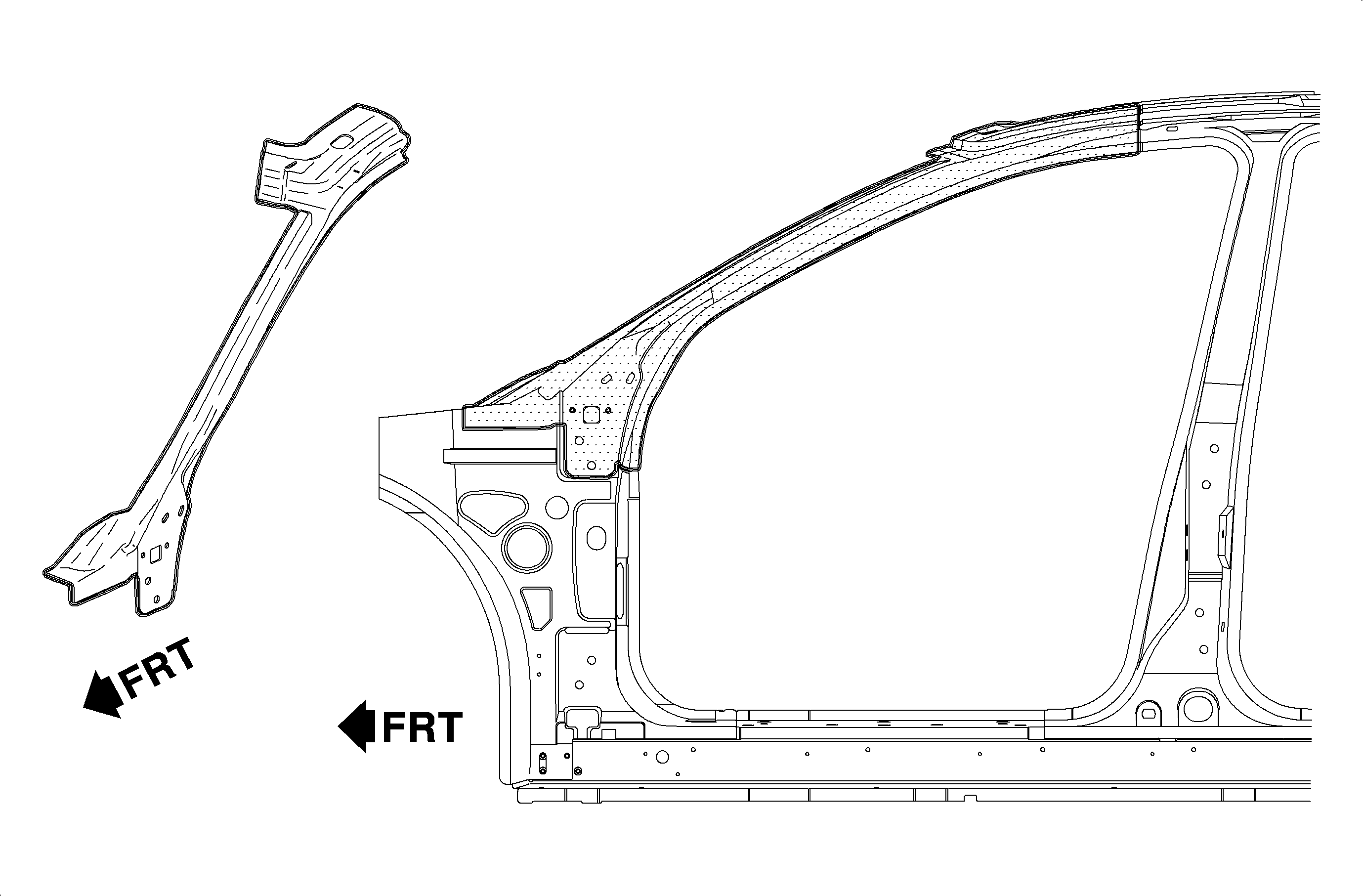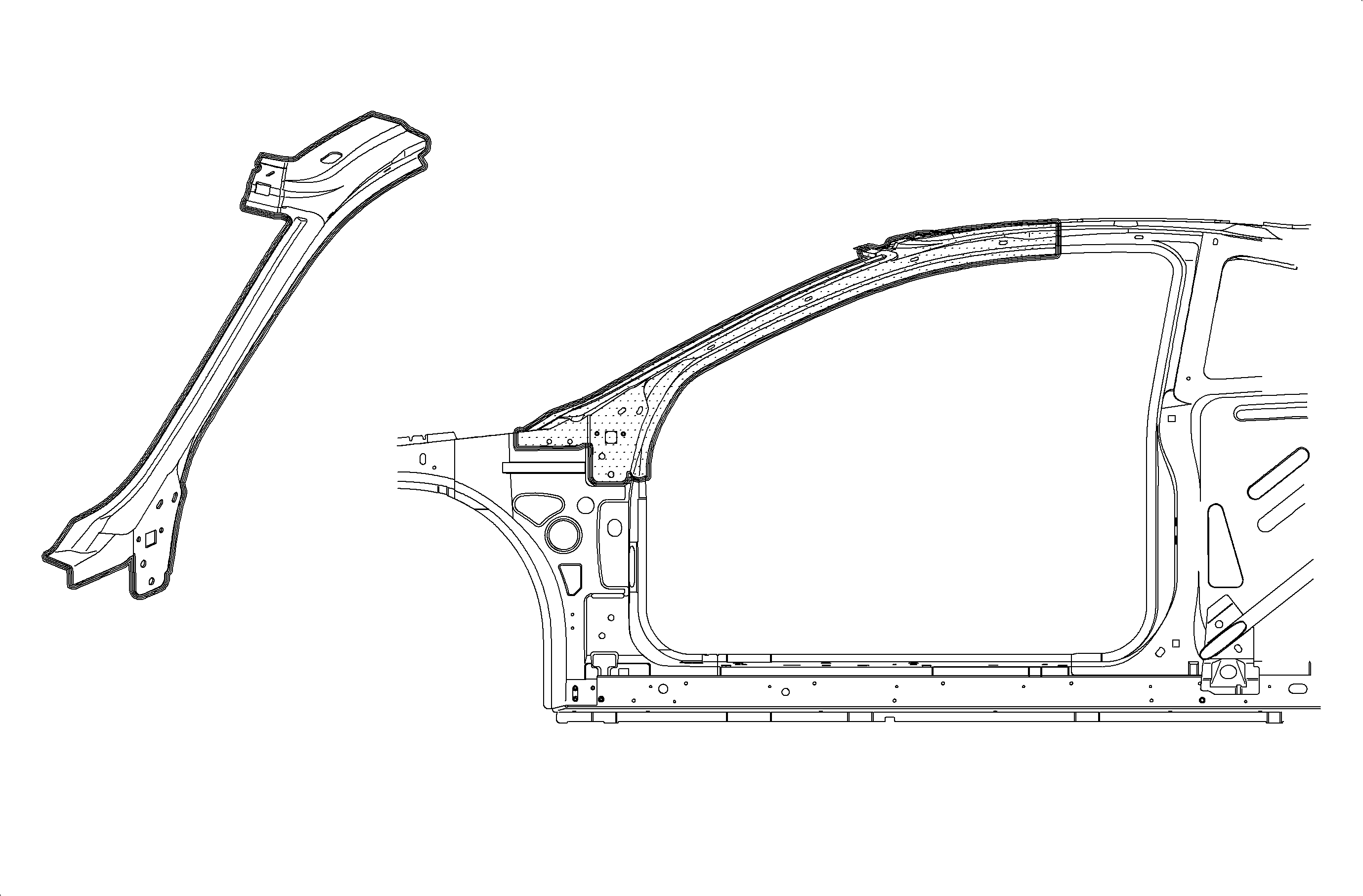Windshield Side Outer - Sectioning Replacement Sedan/Wagon
- Note the amount and location of the spot welds.
- Remove the sealer and drill spot welds from:
- Cut the service part along the joint area. DO NOT damage the windshield side inner.
- Clean all of the weld seams with a wire brush, prime, and seal all repair areas.
- Apply a permanent underbody sealant.
- Prime with a 2-part catalyzed primer.
- Apply sealers and corrosion protection materials according to the information in the Body Paint section of this service manual or the paint manufacturer's recommendations.
- Perform additional procedures as necessary to remove unused areas of the service part. Drill 8 mm (5/16 in) plug weld holes as necessary in the locations noted from the original section.
- Construct a joint reinforcement 100 mm (4 in) long to back up and reinforce the joint. Unused sections of the windshield pillar service part can be modified to fit behind the joint.
- Clean the surface for welding and grind the primer off of the new part at the connecting points. Apply 3M® Weld-Thru Coating, P/N 05913, or equivalent, to all areas to be welded.
- Stitch weld along the entire joint. Make 25 mm (1 in) gaps between, then go back and complete the stitch weld. This will create a solid joint with minimal heat distortion.

Important: Only the windshield side outer may be sectioned. The upper joint must be at least 50 mm (2 in) below the frame windshield inner upper, most forward flange. Repair and restoration of as much structure as possible before cutting and preparing the joint for welding is imperative.
| 2.1. | The front end hinge pillar outer |
| 2.2. | The windshield side inner |
Important: Ensure that proper corrosion protection processes are used on all repair areas.
Important: To ensure a secure weld the windshield side outer sectioning joint should have a gap of approximately one and a half times the thickness of the metal. Trim the parts as necessary to achieve this.
Windshield Side Outer - Sectioning Replacement Coupe
- Note the amount and location of the spot welds.
- Remove the sealer and drill spot welds from:
- Clean all of the weld seams with a wire brush, prime, and seal all repair areas.
- Apply a permanent underbody sealant.
- Prime with a 2-part catalyzed primer.
- Apply sealers and corrosion protection materials according to the information in the Body Paint section of this service manual or the paint manufacturer's recommendations.
- Cut the service part along the joint area. DO NOT damage the windshield side inner.
- Perform additional procedures as necessary to remove unused areas of the service part.
- Drill 8 mm (5/16 in). Plug weld holes as necessary in the locations noted from the original section.
- Construct a joint reinforcement 100 mm (4 in) long to back up and reinforce the joint. Unused sections of the windshield pillar service part can be modified to fit behind the joint.
- Clean the surface for welding and grind the primer off of the new part at the connecting points. Apply 3M® Weld-Thru Coating, P/N 05913, or equivalent, to all areas to be welded.
- Stitch weld along the entire joint. Make 25 mm (1 in) gaps between. Then go back and complete the stitch weld. This will create a solid joint with minimal heat distortion.

Important: Only the windshield side outer may be sectioned. The upper joint must be at least 50 mm (2 in) below the frame windshield inner upper, most forward flange. Repair and restoration of as much structure as possible before cutting and preparing the joint for welding is imperative.
| 2.1. | The front end hinge pillar outer |
| 2.2. | The windshield side inner |
Important: Ensure that proper corrosion protection processes are used on all repair areas.
Important: To ensure a secure weld, the windshield side outer sectioning joint should have a gap of approximately one and a half times the thickness of the metal. Trim the parts as necessary to achieve this.
